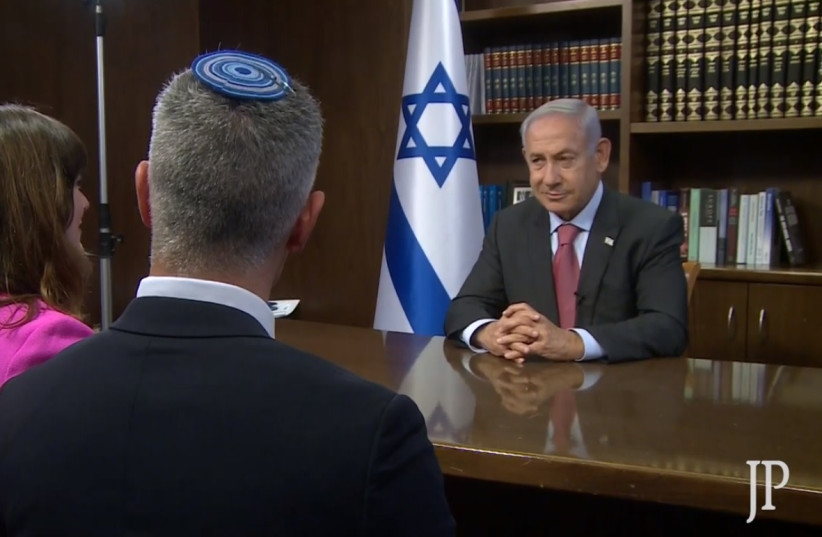The Foreign Ministry plans to summon Ukrainian Ambassador to Israel Yevgen Kornichuk for a reprimand after the embassy released a strong statement opposing Israel’s policy on the war in his country.
Kornichuk’s statements came after Prime Minister Benjamin Netanyahu described the reasons Israel does not provide military aid to Ukraine in an interview with The Jerusalem Post last week.
Netanyahu touted Israeli humanitarian aid to Ukraine and said it’s important for Israel to be able to continue coordination with Russia to strike Iranian targets in Syria.
In light of cooperation between Russia and Iran, Netanyahu expressed “concerns that any systems that we give to Ukraine would be used against us because they could fall into Iranian hands and be used against us. And by the way, that’s not a theoretical possibility. It actually happened with the Western anti-tank weapons that we now find at our borders. So we have to be very careful here.”
Kornichuk: Ukraine never asked for anti-tank systems
Kornichuk pointed out that Ukraine never asked Israel to provide anti-tank systems.
“We want systems to save people’s lives, anti-missile systems. You cannot kill with them,” Kornichuk said on Sunday.

Such systems would not be placed on battlefields, but around civilian population centers to stop attacks by Russian projectiles.
“There may be progress on humanitarian issues, but you can’t win a war with bandages and antibiotics. We have to have the ability to save people’s lives,” Kornichuk stated.
As for the anti-tank systems found in the hands of Iranians and Syrians, the ambassador said “Javelins have been produced for the last 30 years and can be bought on the black market anywhere.
“We heard these arguments in the US Congress right after the war started,” he added.
“Americans put their GPS systems on every piece of equipment sent to Ukraine and there were no complaints after that.”
Kornichuk said that Israel “not providing [Ukraine] with weapons is just a decision to please the Russians.”
Ukraine ambassador: Wagner coup shows Russia's weakness
As for whether the attempted coup against Russian President Vladimir Putin over the weekend should impact Israel’s policy towards Ukraine, the ambassador said it “showed Russia’s weakness and that you cannot rely on any agreements made with the Russians. But if [Netanyahu] feels differently, I can do very little to change his position.”
Foreign Minister Eli Cohen said in a briefing that “despite the complexity with Russia, Israel stood with Ukraine from the beginning of the war until today, public supported its territorial integrity and its sovereignty and voted to condemn Russia in international forums.”
The minister said that Israel sent an unprecedented amount, NIS 80 million, to Ukraine last year and has an even bigger budget to aid Kyiv this year.
In addition, Cohen said that the Israeli missile warning system being tested in Kyiv will save Ukrainian civilians’ lives.
The Ukrainian Embassy to Israel released a strong statement against Israeli policy to its Facebook page on Sunday, following instructions from Kyiv.
The statement said there was a “near absence of Israeli humanitarian assistance to Ukraine” in the first half of this year and that Foreign Minister Eli Cohen’s visit to Kyiv in February was “fruitless.” It also specifically criticized Netanyahu’s comments to the Post.
“All relevant statements made by the Israeli prime minister have always aimed at justifying Israel’s complete inaction in providing Ukraine with defensive assistance over the past 1.5 years,” the embassy stated. “Initially, arguments were centered around Israel’s special relations with Russia in Syria and the fragile situation of the Jewish population in the Russian Federation.
“However, in the latest interview, entirely fictional and speculative assumptions were introduced, suggesting the transfer of Western weaponry from the Ukrainian battlefield to the Syrian and Iranian regimes,” the embassy said.
In addition, the statement pointed out that high-level Israeli diplomats negotiated with the Russian Foreign Ministry, and Jerusalem and Moscow reached an agreement over land Russia claims in the capital, which the Israeli Foreign Ministry touted as a “great achievement.” Plus, they said that Israeli officials attended a Russian Embassy reception and increased trade with Russia rather than sanction it, displaying a “blatant disregard for moral boundaries.”
“The so-called ‘neutrality’ of [the] Israel government is considered as a clear pro-Russian position,” the Ukrainian embassy stated. “The Israeli government pays little attention to the opinions of its own people and disregards the pleas of the global Jewish Diaspora, who unequivocally support Ukraine in its struggle against Russian state terrorism. We urge Israel... to change its position and to support Ukraine with defensive means, to support freedom and democratic world order. We expect Israel to be on [the] right side of history!”
